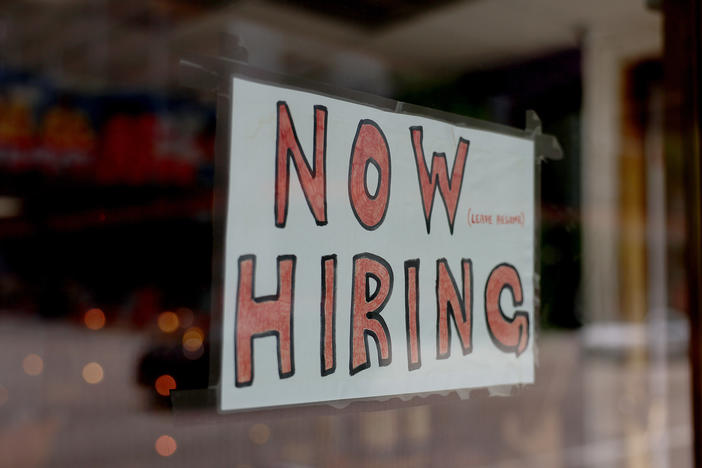Section Branding
Header Content
Senate Democrats unveil a plan for a new tax on billionaires
Primary Content
Democrats say the tax on billionaire assets would help pay for President Biden's social spending bill.
Transcript
RACHEL MARTIN, HOST:
After weeks of negotiating and actually cutting the overall size of the bill by at least a trillion dollars, Senate Democrats say they have a plan to pay for President Biden's social spending agenda. This morning, Democrats released that plan for new taxes on the super-rich. Here's Senate Finance Committee Chair Ron Wyden.
(SOUNDBITE OF ARCHIVED RECORDING)
RON WYDEN: How can you say, when something like 750 billionaires made close to $2 trillion in a pandemic, that they should be able to pay little or no taxes for years on end?
MARTIN: They also have a plan for a new minimum tax on corporations. But will all this be enough to get a deal done? We'll talk about whether they can in a moment with Congresswoman Ilhan Omar of Minnesota. But first, we're going to bring in NPR congressional correspondent Kelsey Snell. Hi, Kelsey.
KELSEY SNELL, BYLINE: Hi. Good morning.
MARTIN: So let's start with the basics. How would this tax on the super-rich work?
SNELL: Well, to start with, Democrats say these new rules would apply to about 700 people, so a pretty narrow group.
MARTIN: Yeah.
SNELL: And that's people who earn more than $100 million a year or have more than a billion dollars in assets over three years. These billionaires would have to report how much their assets gained or lost each year. Then they'd be taxed on those gains. Or they could write off the losses. When it comes to more complicated items, you know, like interest in a business or a real estate, they'd only pay when there's a sale. But there would be an extra fee that's kind of like paying interest on something that's worth a ton of money.
MARTIN: I mean, only 700 people in the entire country. That's a very, as you said, narrow population. And this would raise a lot of money?
SNELL: Democrats say it would raise hundreds of billions of dollars. But we don't have the exact figures yet. And those would be really important when it comes to selling this plan to skeptics, you know? And it's also important for knowing how much of the bill this can pay for. It should be said that this is just a part of how Democrats want to pay for things.
MARTIN: Right. So let's talk about the corporate tax on that note. What can you tell us?
SNELL: Well, that plan is a little bit simpler. It's a 15% minimum tax on big corporations - think companies that consistently earn more than a billion dollars. Now, this is an even smaller group, maybe around 200 companies. And it doesn't do anything to the top corporate rate, which was another thing that Biden and a lot of Democrats had been talking about. Instead, it goes after the companies that they say have avoided paying taxes altogether. You know, this is an idea that has support from a lot of Democrats, including key Democrats like Kyrsten Sinema of Arizona, which is critical to making sure that it can pass.
MARTIN: OK. So key Democrats, what about all Democrats?
SNELL: (Laughter).
MARTIN: I mean, is the party united on this plan?
SNELL: Well, there are some House Democrats, including the chairman of the Ways and Means Committee that writes taxes in the House, that have been skeptical of the billionaire tax in particular. They say it's really hard to administer, and it could just not work. But the details came out late last night. And members are kind of still getting caught up on the details. You know, this is all pretty tricky. And it was always part of the plan for them to raise money through a higher corporate tax rate. But that became politically impossible. So they've been looking for other ways to raise money. You know, as of last night, though, they were still deciding a lot of things. They were still negotiating over not just the tax portions, but the policies that they're trying to pay for, things like paid leave, dental and vision benefits for people on Medicare and the details of climate change provisions. Lots of things are still undecided.
MARTIN: So they have been at this now, Kelsey, for months, negotiating this huge spending bill. Are they really close to getting it done now?
SNELL: Well, Democrats say they're really close. And they say one of the things that changed a lot is that President Biden has gotten really, intensely involved in the past couple of weeks and that they want to get a deal done. You know, Massachusetts Senator Elizabeth Warren was talking to us in the Capitol yesterday. And she said that people should worry when the negotiations are brought, not when they're getting down to the details like this.
(SOUNDBITE OF ARCHIVED RECORDING)
ELIZABETH WARREN: We're finally talking among ourselves, down at the - can I really live with this? - level.
SNELL: She says that's when real deals get cut. And, you know, there's political reality here that they have to get this done or risk alienating voters.
MARTIN: Makes you wonder why they couldn't just shortcut to this part of the process at the beginning.
SNELL: (Laughter).
MARTIN: NPR Congressional correspondent Kelsey Snell. Thanks. We appreciate it.
SNELL: Thanks. Transcript provided by NPR, Copyright NPR.
Bottom Content



